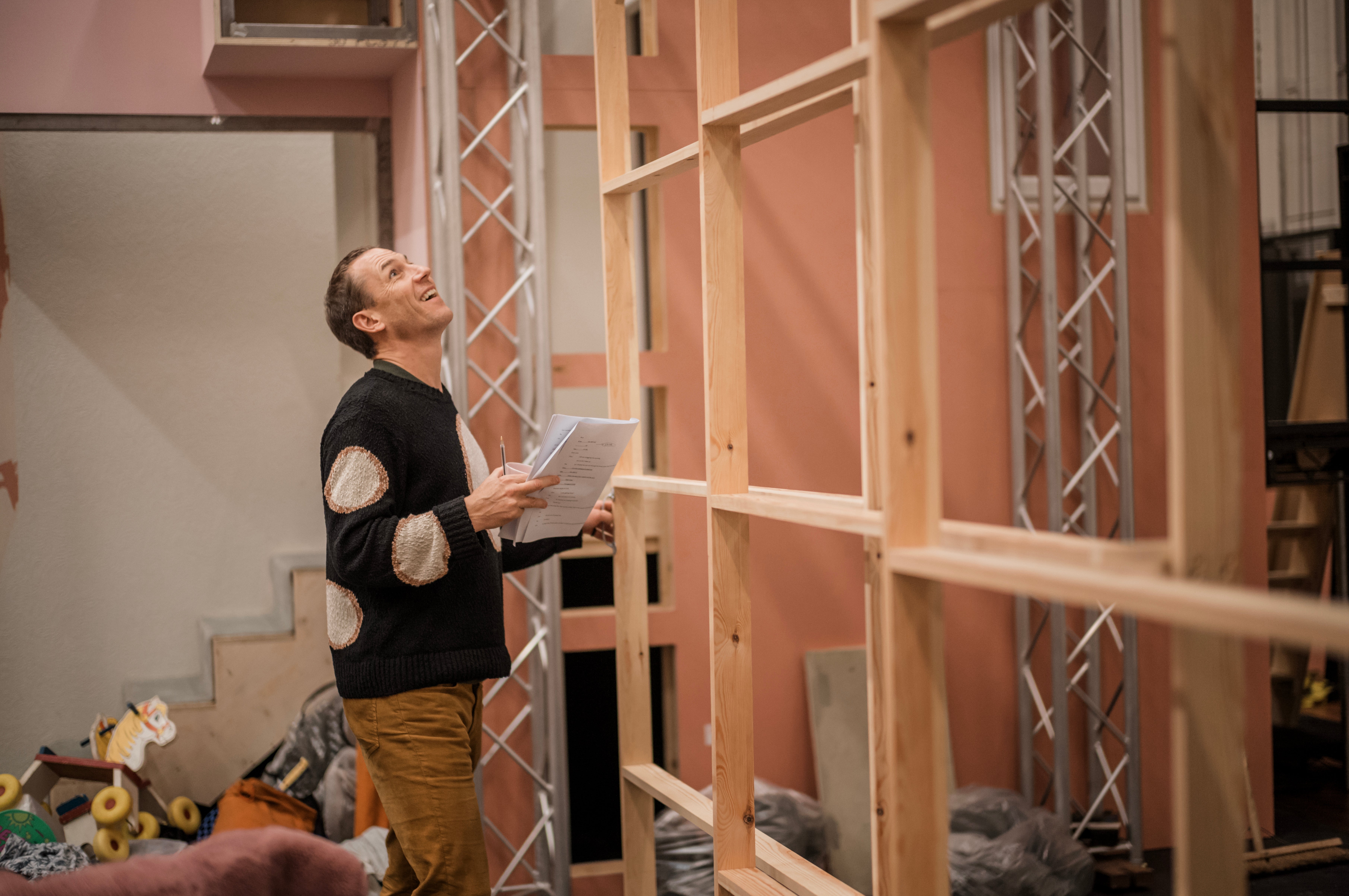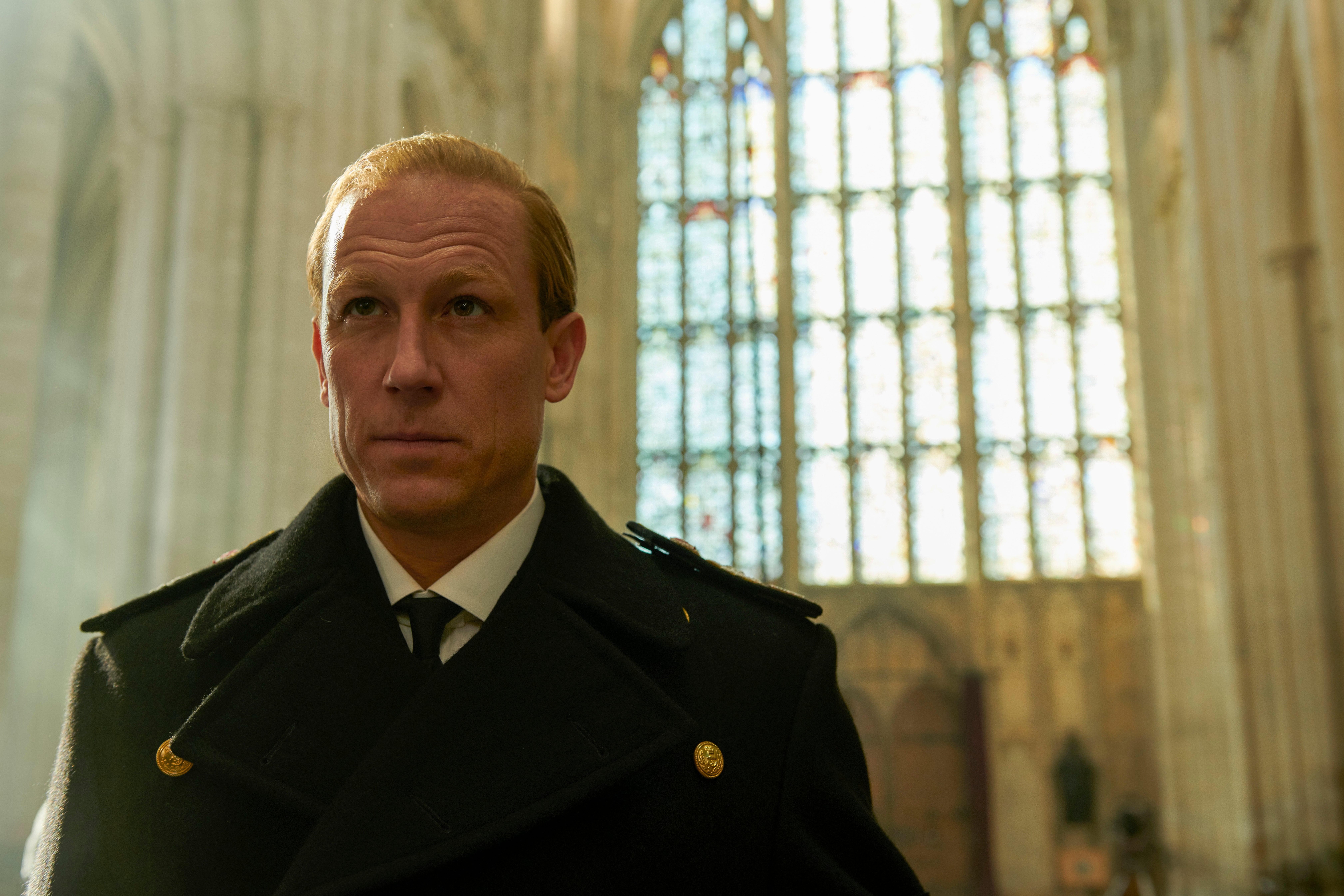
Your support helps us to tell the story
Our mission is to deliver unbiased, fact-based reporting that holds power to account and exposes the truth.
Whether $5 or $50, every contribution counts.
Support us to deliver journalism without an agenda.

Louise Thomas
Editor
In acting, sometimes less is more. Tobias Menzies is from the school that favours restraint. He won an Emmy for his understated portrayal of a weary and frustrated Prince Philip in The Crown, and managed to keep the straightest of faces as Sharon Horgan’s gynaecologist in her filthy sitcom Catastrophe. He’s a master at conveying emotion with barely a twitch, as a self-conscious therapist in the tender indie You Hurt My Feelings, or playing Aisling Bea’s awkward love interest in her comedy This Way Up. “I like roles where the inside is bigger than the outside,” he says. “I’m drawn to interiority.”
Menzies turned 50 earlier this year – “I don’t love the number, I’d rather it started with a four”– and he’s been on stage and screen for 26 of those years. His face feels very familiar when we meet in a back office in the labyrinthine corridors of the National Theatre: the square British jaw, the long vertical creases down each cheek – but up close you can see his brown eyes are marked by speckles. I’m trying to break through his restraint, and throughout our conversation, a couple of laughs do trickle out. At one point, he reminisces on having his Crown co-star Helena Bonham Carter for a housemate, after she took him under her wing while his place was being renovated – “Er yes, she does wash up!” he chuckles. But mostly he is measured, contemplative; a tough nut to crack.
It’s an unseasonably hot day in September, and Menzies is on a break from rehearsing his new play, The Other Place, inspired by Sophocles’ 2,500-year-old drama Antigone. This Ancient Greek tragedy, with its central moral dilemma of individual conscience versus power and authority, has exerted an incalculable influence on Western drama. Playwright after playwright has reimagined the tale of the uncompromising heroine who rebels against the wishes of new Theban king Creon, by seeking to honour her wronged brother – killed in a civil war while attempting to reassert his right to share the throne.
In this starry production, Menzies is Uncle Chris – whom one might equate to Sophocles’s cruel, unbending Creon – while House of the Dragon’s Emma D’Arcy is his niece Annie (Antigone) and Saltburn’s Alison Oliver her sister Issy (based on Ismene). It’s not the only Greek tragedy being updated in the West End this autumn either. Robert Icke’s Oedipus, starring Mark Strong and Lesley Manville, will be at the Old Vic.
At the National, the modern setting is a suburban family home (with Foals’ Yannis Philippakis composing the music). Uncle Chris is getting on with remodelling the house, a year after the death of the sisters’ father. Annie’s sudden arrival, after years of absence, threatens to fracture everything. The cast have been workshopping the play with writer Alexander Zeldin for almost a year, with the scripts ever-changing as rehearsals continue. “We do a lot of improvisation, and Alex will use that in his writing,” says Menzies. “So the style will be hyper-naturalistic, and there’s quite a bit of me in there, by nature of the way that we’re building it.”
We speak only a week before the play’s opening night, but he still can’t be certain what kind of performance he will give. “At the heart of it, Chris is a man who’s trying to outrun his fate,” he says. “There is a lot of suppression going on psychologically.”

Whether by accident or design, Menzies keeps landing parts in projects with huge, committed fandoms. He was Edmure Tully in Game of Thrones, the groom at the infamous “Red Wedding”. Then came historical fantasy Outlander; and finally The Crown. He played Philip in its middle seasons, set between the Sixties and Eighties, when the royal consort was suffering from midlife discontent. Menzies, who passed on the mantle to Jonathan Pryce, has empathy for the actors who starred in the later seasons and constantly had to defend the show from claims of historical inaccuracy. “We had the easier job of it,” he says. “It is an act of drama, you know, it’s not documentary, and I think for the first few seasons we had a helpful veil of time on it. That meant that we could make it dramatic, and people weren’t going to get upset about that. Fundamentally, at the end, the show was still doing the same things. It just caused a bit more rumpus.”

Time-travel show Outlander, meanwhile, had Menzies playing the dual roles of a historian and his callous ancestor for the first three seasons. The Highlands-set drama, now in its seventh season, is massively popular around the world, but Menzies notes that it hasn’t “really meaningfully landed in this country”. He thinks this might be because “there’s a slightly romantic aspect of the Scottish history-ness of it, where maybe Brits are like, ‘Hey, don’t tell us about that,’ because it’s written by an American”.
In his 2022 memoir, Outlander lead Sam Heughan wrote about how he felt betrayed by the creative team after filming a scene where his character, Jamie Fraser, is raped by Menzies’s Black Jack Randall in a prison. Heughan wrote that he didn’t feel it was necessary to be naked for the scenes, and felt that it sexualised a horrific moment. He called the experience of shooting the sequence “harrowing” and “exhausting” and said that it prompted him, a producer on the show, to hire an intimacy coordinator.
Menzies is taken aback when I mention Heughan’s words. “That’s the first time I’ve heard that, that’s sad to hear,” he says, taking a deep breath and leaning back in his chair. “My feeling about what we shot was that it didn’t feel decorative – it felt earned by what was going on in the drama. I felt that we showed something very, very unpleasant, and honest. It is shocking and certainly we went quite dark with it, but that felt like a way of avoiding the accusations of it being sexualised and titillating. We just made it very, very brutal, which is what that is.”
He says that what happened in the prison scene was the “fundamental wound” that so many of the show’s stories unfolded from. “Whether we could have done that by allusion or by reference, that’s a question that was above my paygrade at that time.”

While Menzies is mostly known for his straight roles, he has subverted this seriousness in a few comedies over the years. And it’s Horgan, Ireland’s voice of a generation, who has often spotted the funny in him – she first cast Menzies as a rich man with no personality in her Noughties show Pulling. They worked together again in Catastrophe, and then Horgan’s pal Aisling Bea, another terrific Irish voice, cast them both in This Way Up. Menzies says he’s not an “inherently funny bones kind of guy”, but it’s his straightness clashing with the absurdity of Horgan and Bea, who play sisters, that brings the comedy. “I feel very grateful that they see something funny in me,” he says.
Many actors are obsessed with the idea of showing off their versatility, of each job being the antithesis of the last, but that doesn’t bother Menzies. He admits that he would find a very extroverted role “a lot harder to inhabit”. “When I hear actors talking about range, it’s not something I necessarily relate to,” he says.
It could be helpful to have plenty of skin in life – sometimes I feel like I could use an extra layer or two
This Way Up, a smart, sublime portrait of mental illness and sisterhood that tickles you one minute and squeezes your heart the next, ran for two seasons and ended on a cliffhanger in 2021. Fans were bereft, and Bea later said she found the show “incredibly emotionally demanding and challenging – I think two series is my limit”. Does Menzies want it to come back? “I loved doing it,” he says, “but part of what makes it so brilliant is that Aisling wrote very close to her own skin. There’s a lot of herself in it, which often is what makes such good work. And that does have a cost, so I can totally relate to why she would think, ‘I poured it all out into those two and I haven’t got a third in me.’ Maybe one day.”
Menzies is a sensitive being. He’s described himself in the past as “porous”, and says now that he yearns to have a tougher exterior. “It could be helpful to have plenty of skin in life – sometimes I feel like I could use an extra layer or two.” But for acting, he acknowledges, it’s useful to be thin-skinned when you’re making the work, and thick-skinned “when you’re trying to sell it”. “It is a central contradiction to acting that you have to be very available at some points and then really protect yourself at others. In that way, it’s quite schizophrenic.”

That’s a part of the job that will never change, but a lot has transformed since Menzies, the child of a BBC radio producer and a drama teacher, finished his training at Rada and started acting in 1998. The biggest shift, for him, has been the internet – the dawn of streaming, self-tapes, Zoom meetings, and being able to watch classic movies at the touch of a button. “I don’t feel like a luddite, or like I want to resist it,” he says. “There are amazing advances, and it’s a real force for good some of this technology. But I think there’s a rapidity to it which can be challenging for an art form that requires contemplation to get somewhere interesting. The coke-iness of all this” – he lifts up his phone – “can get in the way of that.”
Theatre, he says, is a space he’ll always come back to because it’s analogue. “No one decides what you’re looking at, no one’s harvesting your data – it’s just a communal experience that’s really ancient. In a weird way, those spaces are becoming more radical, not less, more relevant, not less, as that digital side of life really starts to invade so much of our day to day.”
His next project, F1, starring Brad Pitt and Javier Bardem and out next year, couldn’t be further from the London theatre scene. He spent last summer shooting at various grands prix around the world with the Hollywood stars. Pitt, he says, is an “ordinary man living an extraordinary life”, whose handsomeness is “sort of shocking in the flesh”. For now, though, Menzies is heading back into the bowels of the National Theatre for more rehearsals for The Other Place. Maybe this will be the performance where the restraint falls away. Where he screams, laughs maniacally and thrashes across the stage. The script is still being written after all.
‘The Other Place’ is in the Lyttelton, National Theatre until 9 November







